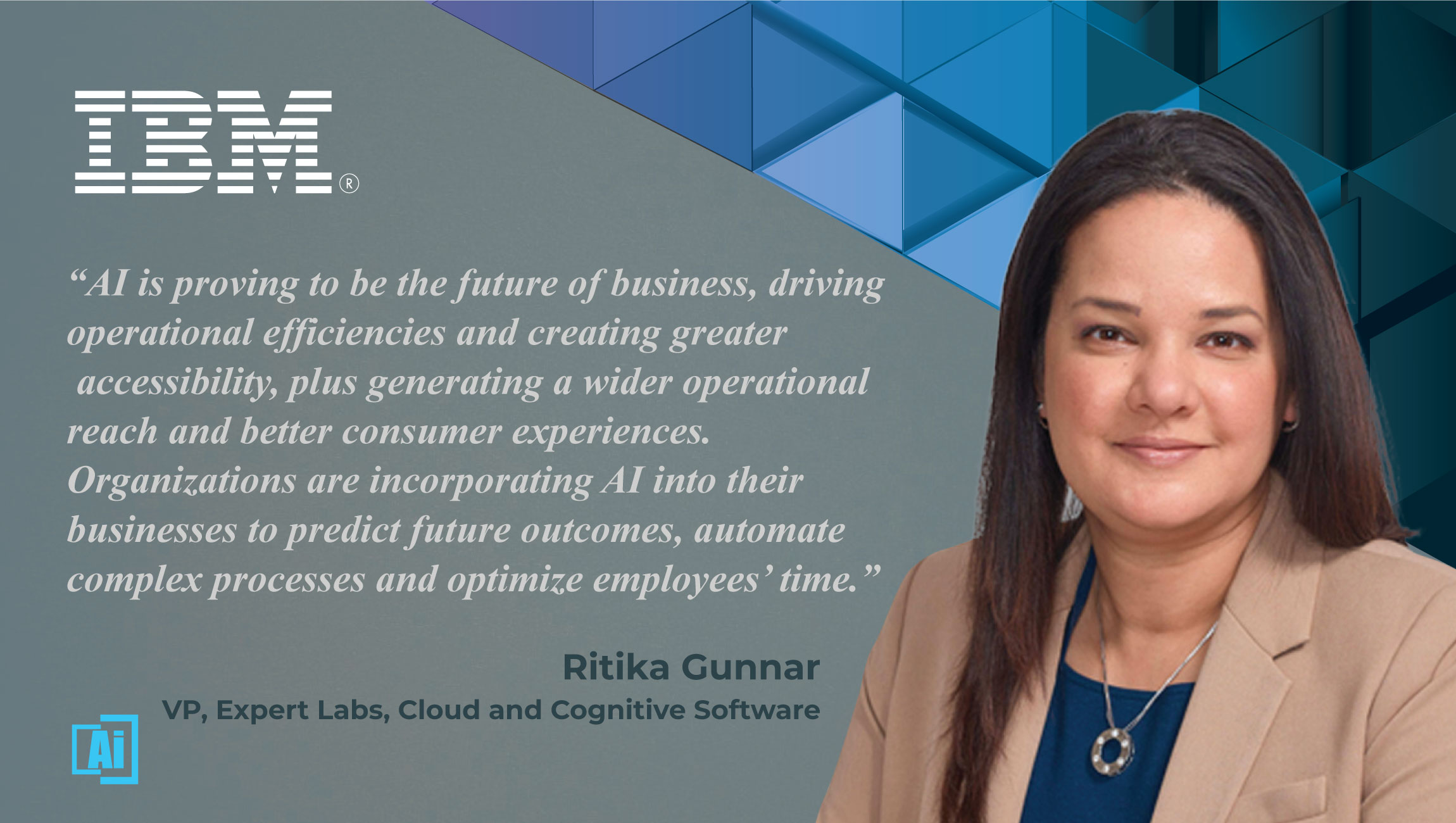AiThority Interview with Ritika Gunnar, VP, Expert Labs, Cloud and Cognitive Software at IBM

Please tell us about your current role and the team / technology you handle in the company.
I’m currently the Vice President of Expert Labs for IBM Cloud & Cognitive Software. We help organizations fully realize the potential of artificial intelligence in keeping their business strong in a highly competitive landscape. I lead a team of over 2,400 highly technical experts focused on advising, architecting and delivering client success with data, automation, and other AI use cases. I actually started at IBM in systems management, then moved to data, moved again to analytics, and from there to artificial intelligence. Even within AI, I’ve done everything from engineering, to technical sales, to offering management. It’s been highly valuable for my career to be able to start in one area, expand my knowledge about a particular domain, then transition to another area. I’ve learned from each move, developing a solid foundation critical to my current role helping businesses adopt new technologies.
Could you tell us more about the third annual list of women in AI that IBM is recognizing this month?
The trailblazing women included in our annual list of Women Leaders in AI have created an environment where more and more women can push boundaries in the technology industry, make their voices heard, and open doors for the next generation. It’s critical to celebrate and share these stories to keep that momentum, which is why we are honoring 40 amazing women from 18 countries around the world who are shaping the future of artificial intelligence and how advancements in natural language processing, automation and trustworthy AI can be used to help organizations better predict outcomes, automate processes and drive new efficiencies.
The list honors leaders from AdMed, The Ad Council, The Clorox Company, City of Austin, EY, Ford Motor Company, Lloyds Banking Group, Mitsui Chemical, Telstra, Vodafone New Zealand, Westpac, and many more. These incredible leaders are breaking new ground using AI to improve the effectiveness of advertising, empower farmers with essential crop forecasting tools, helping to improve food safety, keeping constituents up to date during the COVID-19 pandemic, and much more.
Recommended: AiThority Interview with David Olesnevich, Head of Product – IBM Watson Advertising at IBM
Why is it important to celebrate diversity and inclusion in the field of AI?
In the span of a year, the COVID-19 pandemic upended generations of working women, with more than 5 million just in the US losing or leaving their jobs. In fact, new research from the IBM Institute for Business Value shows that fewer women today hold senior vice president, vice president, director and manager roles today than they did in 2019. We created the annual Women Leaders in AI program in 2019 to help encourage increased diverse participation in the field and provide honorees a network for shared learning. My hope is that others will read the stories of these remarkable leaders and find inspiration—and, just as important, see glimmers of themselves.
Additionally, the importance of having diversified thinking behind innovations in AI cannot be understated. Diversification of thought is key to the development of AI. We’ve seen that as more variety of thought goes into creating the technology, there is a greater likelihood of mitigating bias, promoting ethically operated AI and improving confidence in AI systems. Ultimately showing that diverse work practices enable a deeper trust in the programs that are developed, leading to better economic returns and benefits for all. We celebrate the steps that have been taken to create a more diverse and inclusive AI field, as we continue to strive towards making it that much better.
Could you share a few examples of innovative ways businesses are using AI today?
AI is proving to be the future of business, driving operational efficiencies and creating greater accessibility, plus generating a wider operational reach and better consumer experiences. Organizations are incorporating AI into their businesses to predict future outcomes, automate complex processes and optimize employees’ time.
I am inspired by three of the women recognized on this year’s list of Women Leaders in AI – Chimka Munkhbayar, Helen Tsai and Manoela Morais – who created a solution called Agrolly as part of IBM’s Call for Code Challenge in 2020. Agrolly uses IBM Watson Studio to help farmers plan crop production and minimize risks caused by extreme weather conditions.
Another example is related to COVID-19. The COVID-19 pandemic put new strains on organizations who experienced 10-100 fold increases in call volumes from customers and stakeholders who needed fast access to information. To prevent customers waiting for hours on the phone as a result of the COVID-19 pandemic, another one of our honorees Ekaterina Ostankova, a product manager at Lloyds Banking Group, played a pivotal role in implementing a virtual assistant using IBM Watson Assistant that is addressing important customer inquiries.
These innovators join organizations like Humana, Kroger, GM Financial, Highmark Health, Clark County and many more who are using IBM Watson as a transformation agent to help drive results for the employees, customers and citizens they serve.
Also Read: AiThority Interview with Shelley Morrison, VP, Demand Center at Domo
Could you tell us more about your recent announcement with Humana and how they are using IBM Watson? What kind of data management skills should a company have to fully leverage Watson?
Humana recently announced that they will use IBM Watson Assistant to help provide a better member experience while providing greater clarity and transparency on benefits and other related matters for their Employer Group members. Clearly navigating the ins and outs of our health coverage is particularly important today, and IBM Watson Assistant will help Humana create an innovative, personalized experience to do exactly that.
IBM Watson is AI for business and we’ve designed our solutions so that developers and line of business leaders can build and scale AI without significant data science expertise. IBM Watson solutions come pre-integrated and pre-trained on a flexible information architecture that helps accelerate production and deployment of AI. In fact, global research firm Gartner just named IBM a leader in its Magic Quadrant for Cloud AI Developer Services, which evaluates services that help development teams and business users adopt AI without requiring deep data science expertise.
Your prediction on the future of customer experience transformation using AI ML products
The customer experience has already been radically redefined by AI and machine learning products over the years. Virtual assistants have become commonplace across the industry for helping resolve customer concerns, and even support live human agents as they work with customers to find a solution. This technology continues to improve year after year with advancements in natural language processing, becoming increasingly more self-reliant and personalized. This is an area IBM continues to invest R&D in – for example, just last year we brought new capabilities from IBM Research to IBM Watson that help virtual assistants better understand the nuances of the human language, such as colloquialisms, to help create a better experience for customers.
An advice to every CIO looking to improve digital transformation models for their company
My advice to each and every CIO looking to improve digital transformation models for their company is to ensure the integration of new technologies like AI are first grounded in actual business outcomes. Too often, AI and automation are looked at as a “silver bullet” for digital transformation. This issue has only been exacerbated during the pandemic as many organizations quickly deploy this technology to stay operational, without a real game plan over the long term. Business objectives should always come first and foremost.
Also Read: AiThority Interview with Sofia Altuna, Global Product Partnerships at Google Assistant
Thank you, Ritika! That was fun and we hope to see you back on AiThority.com soon.
Ritika Gunnar is the Vice President of Expert Labs for IBM Cloud and Cognitive Software. She leads a team of highly technical experts who work with clients on their journey to achieve stellar business results. Her focus is on the complementary fields of Data & AI, Automation, and many other AI applications. Prior to this role, Ritika was the Vice President of Data & AI Expert Labs Offerings for IBM Watson and many other parts of the Data and AI portfolio.
Ritika joined IBM as a software engineer and has held numerous development and support roles in her career. Ritika holds a Bachelor of Science in Computer Science and an Executive Masters in Business from the University of Texas at Austin. She currently resides in New York.

IBM is a leading cloud platform and cognitive solutions company. Restlessly reinventing since 1911, we are the largest technology and consulting employer in the world, with more than 350,000 employees serving clients in 170 countries. With Watson, the AI platform for business, powered by data, we are building industry-based solutions to real-world problems. For more than seven decades, IBM Research has defined the future of information technology with more than 3,000 researchers in 12 labs located across six continents.


Comments are closed.